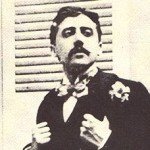Proust's Political Wisdom
 Within A Budding Grove develops Marcel Proust's ideas about love, art, class, and sex. But it also opens a side of Proust that is rarely if ever mentioned: his surprisingly astute analysis of politics.
Within A Budding Grove develops Marcel Proust's ideas about love, art, class, and sex. But it also opens a side of Proust that is rarely if ever mentioned: his surprisingly astute analysis of politics.
Within A Budding Grove is the second great subdivision of Marcel Proust's Remembrance of Things Past. It develops Proust's ideas about love, art, class, and sex. It contains some of Proust's funniest passages and some of his most annoyingly precious. But it also opens a side of Proust that is rarely if ever mentioned: his surprisingly astute analysis of politics.
Please excuse a long quotation, which I've abridged (to the extent I could) for greater clarity:
In the days of my early childhood ... no 'good' house would ever have opened its doors to a Republican. ... But, like a kaleidoscope which is every now and then given a turn, society arranges successively in different orders elements which one would have supposed to be immovable, and composes a fresh pattern. Before I had made my first Communion, ladies on the 'right side' in politics had had the stupefaction of meeting, while paying calls, a smart [ie fashionable] Jewess. These new arrangements of the kaleidoscope are produced by what a philosopher would call a 'change of criterion.' The Dreyfus case brought about another .... Everything Jewish, even the smart lady herself, fell out of the pattern, and various obscure nationalities appeared in its place. The most brilliant drawing-room in Paris was that of a Prince who was an Austrian and ultra-Catholic. If instead of the Dreyfus case there had come a war with Germany, the base of the kaleidoscope would have been turned in the other direction, and its pattern reversed. The Jews having shewn, to the general astonishment, that they were patriots also, would have kept their position, and no one would have cared to go any more, or even to admit that he had ever gone to the Austrian Prince's.
We see these kaleidoscope twists continuing into our own day. Feminists turn into anti-pornography activists and make common cause with the religious conservatives they once despised. Pro-lifers engage with end of life issues and find alliances with Naderite critics of for-profit medicine. One-time anticommunists are jolted by 9/11 into transferring their admiration from anti-Soviet mujahedeen to anti-jihadist secular Muslims.
And then the kaleidoscope twists again, and again old alliances and relationships mutate into strange and unexpected forms. A town like Greenwich, CT can drift from ultra-Republican in 1985 to super-Democratic in 2005. John L. Lewis' Appalachia is the only part of the country to become more Republican between 2004 and 2008.
I think of an especially foolish book I once read that tried to trace the history of modern conservatism back to the Ku Klux Klan of the 1920s.
That author "hails women’s suffrage as progressive and damns immigration restriction as antipluralist and reactionary. Yet many of the most important proponents of suffrage favored immigration restriction — and many of the pro-immigrant groups opposed suffrage. Advocates of racial equality like Norman Thomas could also be adamant isolationists; internationalists like J. William Fulbright could be determined segregationists."
Could it really be true that Norman Thomas was "left wing" in the 1920s and 1930s, "right wing" in the 1940s and 1950s, and "left wing" again in the 1960s when he opposed Vietnam in language similar to the language with which he had opposed U.S. entry into World War II?
The great lesson Marcel Proust tries to impart is the mutability of human life. That lesson applies to politics too. Coalitions combine, separate, recombine. Nothing remains unchanged, no matter how solid it may seem. Or, as Proust concludes at the end of Swann's Way: "Houses, roads, avenues are as fugitive, alas, as the years."